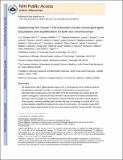Sequencing the Mouse Y Chromosome Reveals Convergent Gene Acquisition and Amplification on Both Sex Chromosomes
Author(s)
Pyntikova, Tatyana; Brown, Laura G.; Graves, Tina; Minx, Patrick J.; Fulton, Robert S.; Kremitzki, Colin; Koutseva, Natalia; Mueller, Jacob L.; Rozen, Steve; Hughes, Jennifer F.; Owens, Elaine; Womack, James E.; Murphy, William J.; Cao, Qing; de Jong, Pieter; Warren, Wesley C.; Wilson, Richard K.; Skaletsky, Helen; Soh, Ying Qi Shirleen; Alfoldi, Jessica E.; Page, David C; ... Show more Show less
DownloadPage_Sequencing the mouse.pdf (1.198Mb)
PUBLISHER_CC
Publisher with Creative Commons License
Creative Commons Attribution
Terms of use
Metadata
Show full item recordAbstract
We sequenced the MSY (male-specific region of the Y chromosome) of the C57BL/6J strain of the laboratory mouse Mus musculus. In contrast to theories that Y chromosomes are heterochromatic and gene poor, the mouse MSY is 99.9% euchromatic and contains about 700 protein-coding genes. Only 2% of the MSY derives from the ancestral autosomes that gave rise to the mammalian sex chromosomes. Instead, all but 45 of the MSY’s genes belong to three acquired, massively amplified gene families that have no homologs on primate MSYs but do have acquired, amplified homologs on the mouse X chromosome. The complete mouse MSY sequence brings to light dramatic forces in sex chromosome evolution: lineage-specific convergent acquisition and amplification of X-Y gene families, possibly fueled by antagonism between acquired X-Y homologs. The mouse MSY sequence presents opportunities for experimental studies of a sex-specific chromosome in its entirety, in a genetically tractable model organism.
Date issued
2014-09Department
Massachusetts Institute of Technology. Department of Biology; Whitehead Institute for Biomedical ResearchJournal
Cell
Publisher
Elsevier
Citation
Naba, Alexandra, Karl R. Clauser, and Richard O. Hynes. “Enrichment of Extracellular Matrix Proteins from Tissues and Digestion into Peptides for Mass Spectrometry Analysis.” Journal of Visualized Experiments 101 (2015): n. pag.
Version: Author's final manuscript
ISSN
1097-4172
0092-8674